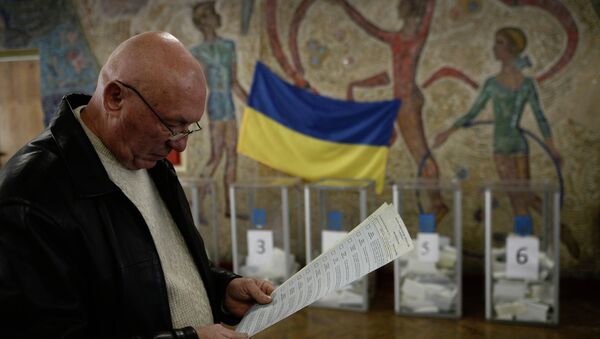WASHINGTON, October 28 (RIA Novosti) – The results of the Ukrainian parliamentary election highlight the country's democratic maturity but a coalition government between the two leading political forces is needed to restore stability in the country, foreign policy scholars told RIA Novosti.
Russia expert with the Peterson Institute for International Economics Anders Aslund told RIA Novosti on Monday that the triumph of liberal and moderate parties indicates a change in Ukraine.
"All extremists have been marginalized and neither Svoboda [nationalist party], nor the communists or the Right Sector made it into parliament, which shows Ukraine's democratic maturity," Aslund said.
However, Dmytro Yarosh, leader of the notorious far-right party Right Sector, has made it to parliament, garnering 29.75 percent of the votes in his constituency.
The expert said the Ukrainian elections were free, fair and democratic.
"Three liberal and pro-European parties won and are set to form a stable, reformist coalition government," he said. "Democratic elections probably leading to a stable democratic government as these are ideal."
Aslund stressed that the new government has to undertake serious legal and economic reforms, which is likely to happen.
Also on Monday, Center for International Policy (CIP) senior fellow Harry C. Blaney III told RIA Novosti that a stable government would require the two main parties, backing the president and the prime minister, to form a coalition.
"Ukraine might need a wider political alliance beyond the two leading parties in order to establish a stable government. That will require some compromise and willingness of at least three parties to cooperate for the general good," the scholar said.
Blaney argued that the showing of Prime Minister Arseniy Yatsenyuk and President Petro Poroshenko's parties at the top of the election represents a strong move among the Ukrainian electorate toward greater integration with Europe.
However, the new government will have to deal with the armed conflict in the southeastern Ukraine's breakaway Donetsk and Luhansk regions, as well as find a cure for severe economic problems, including corruption.
With over 80 percent of ballots counted, Yatsenyuk's People's Front is gaining 22 percent of votes at the country's parliamentary election, leaving Poroshenko's Bloc behind with 21.6 percent, according to Ukraine's Central Election Commission.
Another four Ukrainian parties to have successfully passed election threshold are Samopomich (Self-Help), headed by Lviv Mayor Andriy Sadovy with 10.98 percent of votes, Opposition Bloc with 9.48 percent, Oleh Lyashko's nationalist Radical Party with 7.46 percent and Batkivshchyna (Fatherland) party headed by former Prime Minister Yulia Tymoshenko with 5.69 percent.



